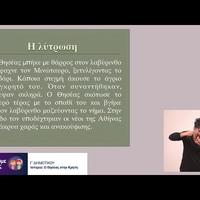Ιστορία | Ο Θησέας στην Κρήτη | Γ' Δημοτικού Επ. 54
Γεια σας, παιδιά, τι κάνετε;
Ελάτε τώρα να γνωρίσουμε έναν σπουδαίο ήρωα της ελληνικής μυθολογίας, τον Θησέα.
Το βασιλόπουλο της Τροιζήνας!
Πάμε να δούμε πώς ξεκινά η ιστορία αυτού του μυθικού ήρωα.
Ο Θησέας ήταν γιος του Αιγέα, βασιλιά της Αθήνας, και της Αίθρας.
Όταν η Αίθρα ήταν ακόμη έγκυος, ο Αιγέας χρειάστηκε να γυρίσει στην Αθήνα.
[Η δασκάλα διαβάζει την καρτέλα]
Πάμε στο 2ο κεφάλαιο της ιστορίας μας, εκεί όπου ο Θησέας σκοτώνει τον Μινώταυρο.
Μερικά χρόνια πριν φτάσει ο Θησέας στην Αθήνα...
[Η δασκάλα διαβάζει την καρτέλα]
Τι ήταν ο Μινώταυρος;
Ο Μινώταυρος ήταν ένα τέρας...
[Η δασκάλα διαβάζει την καρτέλα]
Στο λιμάνι του Φαλήρου, τους αποχαιρέτησαν όλοι κλαίγοντας.
[Η δασκάλα διαβάζει την καρτέλα]
Τους είπε, δηλαδή, αν γυρίσετε νικητές, αν γυρίσετε ζωντανοί, θα βάλετε άσπρα πανιά στο καράβι.
Να ανέβω στην κορυφή του βράχου, στο Σούνιο, να σας δω από μακριά.
[Η δασκάλα διαβάζει την καρτέλα]
Ο Θησέας μπήκε με θάρρος στον λαβύρινθο, δεν φοβήθηκε τίποτα...
κι έψαχνε τον Μινώταυρο.
[Η δασκάλα διαβάζει την καρτέλα]
Πάμε να δούμε τώρα μία άσκηση. Συμπληρώνουμε, παιδιά, σωστό ή λάθος.
Ο Αιγέας ήταν ο βασιλιάς της Αθήνας. Είναι σωστό.
Πάμε στην επόμενη πρόταση.
Από τον Αιγέα και την Ήρα γεννήθηκε ο Θησέας.
Αυτό είναι λάθος. Από τον Αιγέα και την Αίθρα γεννήθηκε ο Θησέας.
Ο Αιγέας, πριν φύγει για την Αθήνα, έκρυψε το σπαθί του και τα χρυσά σανδάλια του στο χώμα...
Τι είναι εδώ; Είναι λάθος κι εδώ.
Έκρυψε το σπαθί και τα σανδάλια αλλά όχι στο χώμα, κάτω από έναν πελώριο βράχο,
και ο Θησέας κατάφερε να τον σηκώσει.
Ο Θησέας νίκησε πολλούς κακοποιούς, ληστές και άγρια ζώα, στο δρόμο για την Αθήνα, που τρομοκρατούσαν και σκότωναν ανθρώπους.
Αυτό είναι σωστό.
Κάποιοι Αθηναίοι σκότωσαν τον γιο του Μίνωα... Σωστό κι αυτό.
Σκότωσαν τον γιο του Μίνωα από τη ζήλια τους, επειδή νίκησε σε πολλά αγωνίσματα.
Οι Αθηναίοι κάθε χρόνο έπρεπε να στέλνουν στον Μίνωα τέσσερις νέους και τέσσερις νέες για να τους τρώει ο Μινώταυρος...
Τι είναι αυτό, τι λέτε; Σωστό είναι;
Λοιπόν, οι Αθηναίοι έπρεπε να στέλνουν κάθε χρόνο στον Μίνωα, νέους και νέες...
αλλά όχι τέσσερις νέους και τέσσερις νέες.
Έπρεπε να στέλνουν επτά νέους και επτά νέες. Άρα είναι λάθος.
Συνεχίζουμε!
Τον λαβύρινθο τον είχε φτιάξει ο ίδιος ο βασιλιάς Μίνωας.
Τι λέτε, είναι σωστό;
Όχι, δεν είναι σωστό. Τον λαβύρινθο τον είχε φτιάξει ο περίφημος αρχιτέκτονας Δαίδαλος.
Την κόρη του Μίνωα την έλεγαν Δηιάνειρα.
Τι λέτε, είναι σωστό;
Όχι, είναι λάθος.
Την κόρη του Μίνωα την έλεγαν Αριάδνη.
Η Αριάδνη έδωσε στον Θησέα τον μίτο.
Φυσικά και είναι σωστό!
Ο Θησέας σκότωσε τον Μινώταυρο και βγήκε από τον λαβύρινθο μαζεύοντας σιγά-σιγά το νήμα.
Βεβαίως και είναι σωστό!
Συνεχίζουμε...
Ο Μινώταυρος είχε κεφάλι ανθρώπινο και σώμα ταύρου. Τι λέτε, είναι σωστό;
Είναι λάθος.
Ο Μινώταυρος είχε κεφάλι ταύρου και σώμα ανθρώπου.
Ο Αιγέας είπε στον Θησέα πως αν γύριζαν ζωντανοί από την Κρήτη, να βάλουν στο καράβι γαλάζια πανιά.
Τι λέτε, είναι σωστό;
Όχι, ο Αιγέας είπε στον Θησέα πως, αν γύριζαν ζωντανοί από την Κρήτη, να βάλουν στο καράβι άσπρα πανιά.
Να τα δει από μακριά και να χαρεί.
Για να δούμε λίγο, μια ερώτηση που είναι μέσα στο βιβλίο μας.
[Η δασκάλα διαβάζει την καρτέλα]
Άρα είχε, και δύναμη και καλοσύνη, πράγμα πολύ σημαντικό.
Και, λίγα λόγια για τον μύθο...
[Η δασκάλα διαβάζει την καρτέλα]
Αυτό συμβολίζει, παιδιά, ο μύθος αυτός, του Θησέα με τον Μινώταυρο.
Το τέλος της κυριαρχίας της Κρήτης.
Ο λαβύρινθος.
[Η δασκάλα διαβάζει την καρτέλα]
Ότι, δηλαδή, το ίδιο το παλάτι ήταν ο περίφημος λαβύρινθος.
Εσείς, παιδιά, που είστε στην Κρήτη, και ειδικότερα στον νομό Ηρακλείου...
μπορείτε να επισκεφτείτε τους αρχαιολογικούς χώρους της Κνωσσού και το αρχαιολογικό μουσείο του Ηρακλείου.
Πιστέψτε με, έχει πολύ μεγάλο ενδιαφέρον.
Αυτή, παιδιά, ήταν η ιστορία του Θησέα με τον Μινώταυρο.
Είδαμε πώς ο Θησέας σκότωσε το φοβερό αυτό τέρας, με τη βοήθεια της Αριάδνης που τον ερωτεύτηκε και τον βοήθησε.
Η ιστορία του Θησέα, όμως, έχει και συνέχεια στα επόμενα μαθήματα, κι έχει πραγματικά πολύ ενδιαφέρον.
Ευχαριστώ πολύ που παρακολουθήσατε το μάθημά μας, παιδιά.
Χάρηκα πολύ. Σας χαιρετώ!

